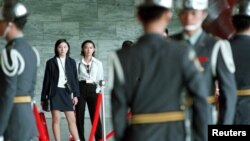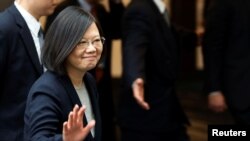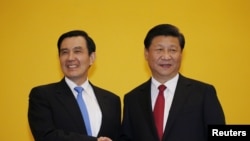The number of short-term university students from China has declined in Taiwan this academic year in what some fear is retaliation by Beijing against a president who takes a guarded view toward relations.
The number of university students from China to Taiwan for non-degree programs, often lasting a single semester, fell from 34,114 in the 2015-2016 academic year to 32,648 the current year, according to Taiwan Ministry of Education figures. The number had risen steadily from 823 just 10 years ago, and it more than doubled from 2011 to 2013.
At Ming Chuan University in northern Taiwan, enrollment from China dropped by two-thirds between September of last year and the semester starting this month. A private technology university in southern Taiwan received 10 students in September, down from an expected 200, the Taipei-based China Post newspaper reported.
Political motive?
Chinese officials do not acknowledge a role in pushing down the number, but academics in Taiwan suspect a political motive. China has bristled toward Taiwan since President Tsai Ing-wen took office in May. Tsai disputes Beijing’s view that the two sides belong to a single China, making any talks impossible.
Educational exchanges are political for China, said Lai I-chung, former vice president of Taiwan Think Tank.
“It’s always used by China as a political tool or something for their political statement,” Lai said. “The student exchanges and the youngsters are able to come to each other’s countries to study, to feel the culture and the different sentiments.
“That will be helpful to better understand each other,” he said.
Warm relations now cooling
China has seen self-ruled Taiwan as part of its territory since the Chinese civil war of the 1940s. Public opinion polls indicate most Taiwanese oppose Beijing’s steadfast goal of eventual unification.
Relations with China surged from 2008 under former Taiwan President Ma Ying-jeou. His government of eight years signed 23 agreements with China, and during his term students began studying en masse at Taiwanese universities.
Officials and analysts in Taiwan say China wants to resist Tsai in ways that will pressure her government into holding talks with Beijing without fanning anti-Beijing hostility among Taiwanese people.
Since Tsai took office, the number of Chinese tour group arrivals from the mainland has also declined, eroding another program that the Ma government had arranged and hurting elements of the local service sector.
In December, the Taiwan government says, China paid African country Sao Tome and Principe to switch diplomatic allegiance from Taipei to Beijing.
That month and in January, China passed its sole aircraft carrier through waters near Taiwan. Tsai was preparing then to visit the United States after a December 2 phone call with then President-elect Donald Trump.
Policy officially unchanged
China’s central government agencies have told Taiwanese recruiters its policy on university students has not changed, said Nathan Liu, dean of Mainland China Education and Exchange for Ming Chuan University. His school normally receives one of Taiwan’s highest head counts for mainland Chinese students.
But Chinese provinces are permitting fewer Taiwan-bound students because they are unsure about broader political relations, Liu said, though provincial officials point instead to parents worried about Taiwan itself or to loss of interest among students.
“This is basically influenced by this bigger political environment or tension across the Taiwan Strait,” Liu said. Students are still keen to study in Taiwan, he said, since they learn about its scenic attractions from elementary school.
“Almost all individual Chinese, whenever they get opportunities, they like to come to Taiwan because it’s something they read (about) from childhood,” Liu said.
Students quickly fit in, as they share a language with Taiwanese students and instructors. Some also use their time in Taiwan to sightsee.
Parents from China do worry about Taiwan’s safety, one mainland student said. In July, a bus caught fire and killed 24 mainland Chinese tourists. Another bus flipped on a freeway off-ramp this month, killing 32 locals. Questions about Trump’s relations with China and Taiwan also “cause a lot of panic,” she said.
But mainland students still come, said Chiu Chui-cheng, deputy minister with the Taiwan government’s Mainland Affairs Council. Degree program students reached 9,327 for the 2016-2017 school year, up from 7,813, according to the Ministry of Education.
Chiu did not comment on why exchange student numbers were down, but said Taiwan wants more to study here.
“In the future the government will patiently continue to steadily promote mainland students coming to Taiwan for studies,” Chiu said. “We welcome more mainland youth to come for opportunities to receive an education with Taiwanese students and share their experience of mainland Chinese development.
“We also hope both sides will value maintaining achievements in university educational exchanges over the years,” he said.









